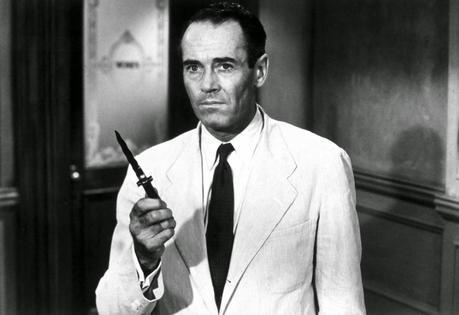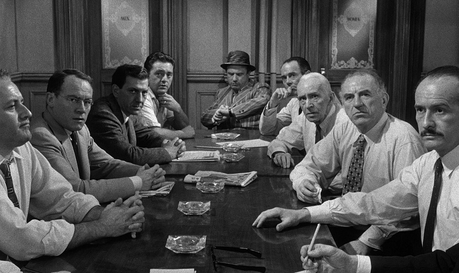
"Do you think you were born with a monopoly on the truth?"
Sidney Lumet was a provocative filmmaker, mixing edgy artistry with liberal outrage. Compared to his later Serpico and Network, 12 Angry Men (1957) seems a square "message picture." But Lumet provides a masterful courtroom parable. Never has a civics lesson been more entertaining.Reginald Rose's script takes place entirely within a sweltering jury room. Twelve jurors weigh the fate of an Hispanic teen accused of murder. Only Juror Number Eight (Henry Fonda) harbors reasonable doubt, citing unconvincing eyewitness testimony and unreliable material evidence. The other eleven jurors contrive to convince him, but they're soon persuaded by Number Eight's arguments.
Historian Rick Perlstein pegs 12 Angry Men as embodyig postwar liberalism: "If only [conservatives] could truly see reason... their prejudices would melt away." Casting Henry Fonda, star of The Grapes of Wrath and ardent progressive, reinforces this interpretation, stressing the accused's wretched background. Certainly the villains are reactionary pin cushions: Number Ten's (Ed Begley) an unapologetic bigot, Three (Lee J. Cobb) a "self-made man" colored by personal demons. And the most eloquent speeches come from Eleven (George Voskovec), an immigrant who resents the jury's casual attitude.
Yet Lumet and Rose construct a compelling fable transcending politics. The case leaves enough ambiguity that the egghead Juror Four (E.G. Marshall) can eloquently counterpoint. Men's real villain isn't bigotry but indifference: most of the jurors want a quick resolution, little caring that a life's at stake. Twelve (Robert Webber) doodles while Seven (Jack Warden) frets over baseball tickets. Ultimately, Men champions dutiful citizens triumphing over apathy. Liberal or conservative, who doesn't want to see the system work?

Henry Fonda (also co-producer) delivers an excellent performance. Juror #8 rivals Tom Joad as his most iconic role, a saintly crusader Fonda makes credible through easygoing charm and cool intelligence. We admire Fonda as the man standing on principle, the eloquent spokesman for justice, using reason rather than passion to persuade. How refreshing is it to watch a movie where logic wins the day?
Most of Men's supporting cast became recognizable character actors. Martin Balsam (the Foreman) was especially ubiquitous, though he's lost among colorful costars. E.G. Marshall's a standout as Number Four, offering cool logic rather than assumptions. George Voskovec and Joseph Sweeney get the most eloquent speeches, wimpy John Fiedler the strongest character arc. Ed Begley and Jack Warden play obvious types; Edward Binns, Jack Klugman and Robert Webber are less distinct. Lee J. Cobb makes a compelling antagonist, selling even his hammy breakdown.
12 Angry Men entertains both for its moral forcefulness and powerful drama. Reality isn't so neat, whether legally or ideologically, but that hardly diminishes its effectiveness.

